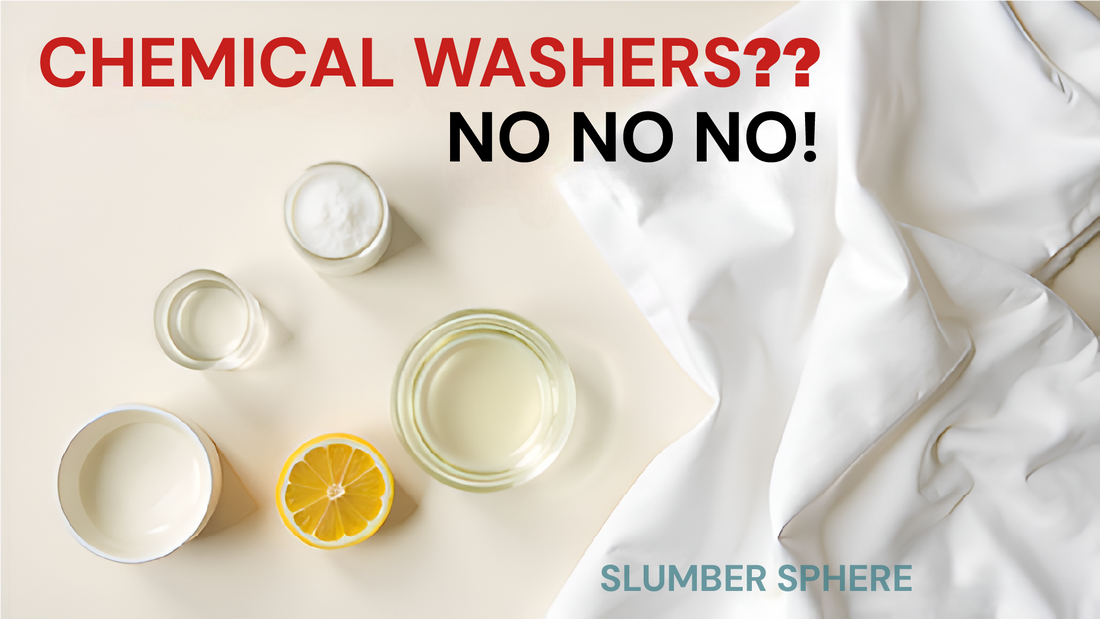
We frequently change our bed sheets, not because we want to, but because they get coarse really soon. Every time we come across this kind of situation, something to blame is the quality and brand. But here’s the miss! The elephant in the room amid all this could be the practices, too. How do we handle our sheets? The kind of detergent we use? The way we wash, dry, soak, and use everything.
Sometimes we are harsh on them due to a lack of time. Extensive chemicals are used to just get rid of the stains. Everything that our bedsheets interact with has an impact on them- the chemical treatments? For sure.
Every time we extensively treat the bedding for extra cleanliness, we tend to move a step towards-
- Discoloration- Chemicals used for stain removals, fade out the sheets, or tend to discolor them sooner over time.
- Fiber Damage- The strong chemical reactions to remove the stains generally target the fabric/yarn for deep cleaning, further damaging it or loosening it or making it coarse.
- Residue- Some chemicals do not wash off clearly and tend to leave residue on the textile surface, which acts as an irritant to your skin when in contact.

Anyway, stains are not everyday stories, the mishaps are occasional, and hence we suggest treating them that way could benefit us in the long run, which would extend the product life by
- Maintaining the fabric strength.
- Preventing discoloration.
- Leaving no residue on the fabric.
- Maintaining the stitching quality.
-
Preventing linting & coarseness.
Certain natural treatments could act on stains and clean them in gentle washing cycles. This typically depends on the type and time of the stain- The older the stain, the harder to remove. Listing a few-
Note- We recommend taking a patch test on a small corner of the textile, as we are unaware of the production methods of the brands being utilised. Some mixtures might act as a bleach on some fabrics or their colors.
-
Baking Soda + Vinegar
Make a paste using baking soda and water. Apply it to the stain, & let it sit for 30 minutes. Then spray the vinegar on the stain, and the fizzing action will pull the dirt from the surface, which can be removed with a normal wash.
-
Lemon Juice + Sunlight
Apply lemon juice to the stain and expose it to the sunlight for 30-40 minutes. Its natural enzymes directly act on the stains to lighten or remove them.
Note- Do not try this method on colored sheets, as lemon has bleaching properties which might leave colored sheets patchy. This is applicable to white sheets only or rust stains.
-
Hydrogen Peroxide + Baking Soda
Hydrogen Peroxide is one of the effective solutions for darker stains. Make a paste using hydrogen peroxide and baking soda, apply it on the required area, let it sit for 30-40 minutes, and rinse it off with cold water.
-
Salt + Cold Water
Applying cold water to the stain and rubbing salt could help get rid of the stain. This particularly helps you better if stains are due to spilled wine.
-
Cornstarch + Milk
Specially impactful on the ink stains. Make a thick paste of milk and cornstarch, apply it to the stain, and let it dry completely. This will lift the dirt, which could be brushed off after drying and rinsed cold after brushing.
-
Hydrogen Peroxide + Dish Soap + Baking Soda
Make a mixture in a spray bottle and spray it on the stain. Allow it to stay for 30-40 minutes and wash off with cold water.
-
Corn Starch + Baking Powder
This is a dry stain-removing method for the fresh stain. Mix the baking powder & corn starch, sprinkle them on the stain. Allow it to absorb the stain and dry, then brush off before regular washing.

Do proceed with regular washing after the suggested treatment.
These methods will work effectively upon immediate or sooner actions on the stain, as older stain demands multiple efforts. These pre-treatments will keep your sheets pristine and optimally durable.

